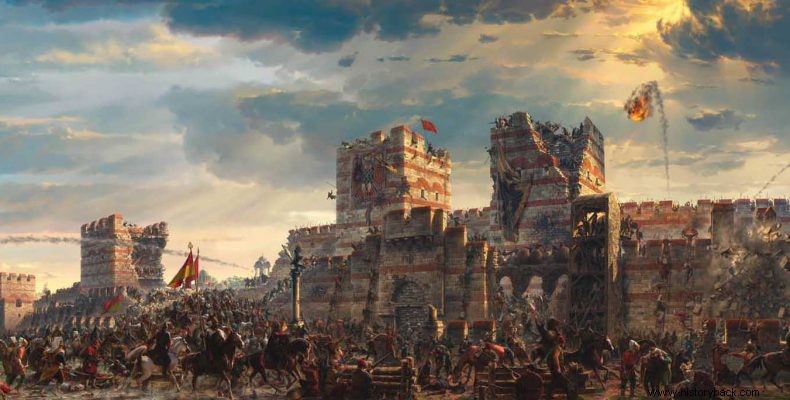
Why didn't the West help Byzantium? This question has plagued historians for years. The answers that have been given vary. In Greece, the refusal of the Westerners to help is emphasized due to the refusal of the Byzantines to submit to the papal church. But this is only one parameter and probably not the most correct one. In the West there really was no mood to support Byzantium.
And there was no disposition not only because the "fanatic" Orthodox Byzantine Greeks did not want to submit to the papal authority, but because both the rivalries between the states of the West and their economic interests forced them not to strengthen the Greeks . At that time, England and France were fighting fiercely with each other (Hundred Years War), while the Italian maritime republics were in such intense commercial competition with each other that all they were interested in was winning markets for their own benefit.
On the other hand, the Italian naval republics had every interest in not seeing the Byzantine Empire strong again, perhaps capable of challenging them for naval primacy. Throughout the 13th and 14th centuries they had worked honorably in the direction of the naval disintegration of Byzantium. It is characteristic that at the time of the Aloysius, almost all of the customs duties for the import of goods into Europe, via Constantinople, were collected by the Genoese of Galata (Peran) and the Venetians.
Since the Italians were financially draining Byzantium, they had no reason to seek to strengthen it. Of course they wanted the City to remain in Greek hands, mainly because if it was taken over by the Turks, the latter would revise the economic agreements. However, the possibility of Byzantium's submission to the Turks seemed relatively distant to the Westerners, even to the Italians, who had direct contact with the East. The Turks, utterly unconnected with those of the sea, they argued, could not take the City without a fleet.
The third, apparently powerful pole of power of late medieval Europe, the pope, wished to strengthen the collapsing Byzantium, on the basis of the submission of the Orthodox Church to his orders. However, no matter how much he sincerely desired it, he was practically unable to do great things. The time had now passed when, at the behest of the pope, thousands of Western Europeans rushed to fight for the "faith". As Stalin said centuries later, "the pope is good, but how many divisions does he have"! And at the given time the pope had neither divisions nor serious influence in the political affairs of the West.
As for the Greek forces, we could say that they were too limited. With little income, cut off from the rest of the world, a lonely island, lost in the unfaithful sea, the City no longer possessed either the old glamor and brilliance, nor the military power necessary for its survival, under the prevailing conditions. The total number of regular forces that the last Paleologian emperors had at their disposal did not exceed 3,000 men, under Andronikos III, i.e. about 100 years before the Fall.
Gradually this number decreased even more. A typical example is the campaign of Bousico in the East. The French Bousico was hired along with 100 cavalry and 1,100 infantry by Emperor Manuel Palaiologos in 1398. With these few, but well-equipped and experienced men, Bousico almost cleared Thrace of the Turks. Lacking financial resources, however, he left the following year for France. Byzantium had reached such a loss that it could not maintain 1,200 men.
In addition to the regular forces, there were also the "militias" so to speak, those able to bear arms, i.e. citizens, who were recruited in cases of need. But they neither had serious equipment, nor, most importantly, military training and experience.
And neither was it possible to train them as soldiers, since all of them had as their primary concern their survival. The estates ravaged by wars and Turkish raids were left uncultivated. Then the spread of the Turks limited the Byzantine territory around Constantinople, Epivates and Silivria. The economic collapse had as a natural consequence the fall in the standard of living, to the point of impoverishment. To avoid starvation, thousands fled to the various monasteries and took the form. Constantinople itself was not inhabited by more than 40-70,000 people, including foreigners.
The only ray of light came from the Peloponnese. And there, however, things were not as rosy as they seemed. In addition to the discord between the various lords and the despots Palaiologos, there was also discord between the members of the imperial family themselves, a discord that proved destructive to the national cause. On the other hand, even the Peloponnese did not have the necessary human resources and the necessary financial resources to strengthen the surrounded Vasilevousa, both during the final siege and earlier.
The regular army of the despots was small, numbering a few hundred soldiers. In these forces the respective despot added a small number of Frankish mercenaries, who constituted the best part of the army. the despots also had a relatively large number of light cavalry, the famous "Soldiers", whom modern Western historians describe as "Albanians".
But the bulk of the military forces of the despotate were simple peasants, free cultivators, or serfs of the "Powerful". For them, what was said about the "militia guards" of Constantinople also applies. Equipped primarily with bows, lacking breastplates and having a strong aversion to enemy cavalry charges, they were useful for 'stealth warfare' missions or sieges, but not for line combat. They also usually refused to campaign across the Isthmus.
